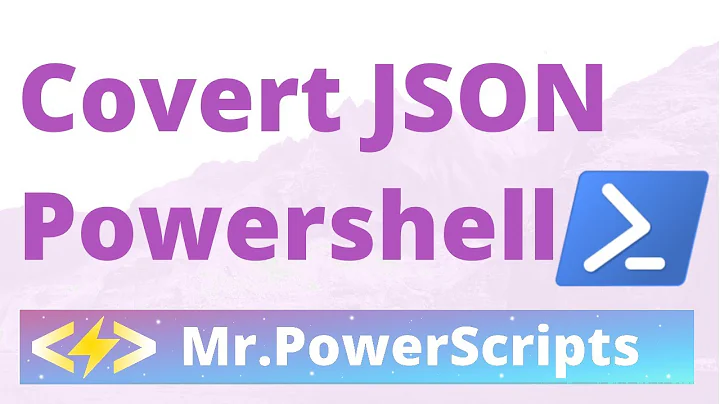Convert JSON to CSV using PowerShell
60,228
Solution 1
By looking at just (Get-Content -Path $pathToJsonFile) | ConvertFrom-Json it looks like the rest of the JSON is going in to a results property so we can get the result I think you want by doing:
((Get-Content -Path $pathToJsonFile) | ConvertFrom-Json).results |
ConvertTo-Csv -NoTypeInformation |
Set-Content $pathToOutputFile
FYI you can do ConvertTo-Csv and Set-Content in one move with Export-CSV:
((Get-Content -Path $pathToJsonFile) | ConvertFrom-Json).results |
Export-CSV $pathToOutputFile -NoTypeInformation
Solution 2
You have to select the results property inside your CSV using the Select-Object cmdlet together with the -expand parameter:
Get-Content -Path $pathToJsonFile |
ConvertFrom-Json |
Select-Object -expand results |
ConvertTo-Csv -NoTypeInformation |
Set-Content $pathToOutputFile
Solution 3
I was getting my json from a REST web api and found that the following worked:
Invoke-WebRequest -method GET -uri $RemoteHost -Headers $headers
| ConvertFrom-Json
| Select-Object -ExpandProperty <Name of object in json>
| ConvertTo-Csv -NoTypeInformation
| Set-Content $pathToOutputFile
I end up with a perfectly formatted csv file
Related videos on Youtube
Author by
Anders Ekelund
Updated on July 09, 2022Comments
-
 Anders Ekelund almost 2 years
Anders Ekelund almost 2 yearsI have a sample JSON-formatted here which converts fine if I use something like: https://konklone.io/json/
I've tried the following code in PowerShell:
(Get-Content -Path $pathToJsonFile | ConvertFrom-Json) | ConvertTo-Csv -NoTypeInformation | Set-Content $pathToOutputFileBut the only result I get is this:
{"totalCount":19,"resultCount":19,"hasMore":false,"results":How do I go about converting this correctly in PowerShell?
-
Dany Gauthier over 6 yearsFor some reason, on my end, the array contained in source json file is converted to the "SyncRoot" property of the results. So I just had to replace .results with .SyncRoot.
-
 Roman about 6 years@DanyGauthier that is because .results is the name of JSON object. I guess you have a name called "SyncRoot". I have a name called "Weights". That messed with me for a while, but once I figured it out it worked :)
Roman about 6 years@DanyGauthier that is because .results is the name of JSON object. I guess you have a name called "SyncRoot". I have a name called "Weights". That messed with me for a while, but once I figured it out it worked :) -
 Piemol over 5 yearsI specifically had to leave out the ".results" (and added -Raw as my json was 'formatted' for readability:
Piemol over 5 yearsI specifically had to leave out the ".results" (and added -Raw as my json was 'formatted' for readability:((Get-Content -Path $pathToJsonFile -Raw) | ConvertFrom-Json) | Export-CSV $pathToOutputFile -NoTypeInformationPowerShell version 4 if it matters. -
 MDMoore313 over 3 yearsUpvoted, I also had to strip out the
MDMoore313 over 3 yearsUpvoted, I also had to strip out the.resultsfrom the one-liner. -
 Santiago Squarzon over 2 yearsYou are over complicating it. A simple function like the one shown on this answer can solve this problem and is more efficient.
Santiago Squarzon over 2 yearsYou are over complicating it. A simple function like the one shown on this answer can solve this problem and is more efficient. -
dougp over 2 yearsThanks. If you can make that work for the example in my answer, I'd love to see it. I can't make it work. Plus, that function is 8 lines. it would replace maybe 5 lines of my code? Not sure what I'm missing here since I'm new to PowerShell.
-
 Santiago Squarzon over 2 yearsUsing the function from that answer an assuming you have the Json converted as an object it would be as simple as
Santiago Squarzon over 2 yearsUsing the function from that answer an assuming you have the Json converted as an object it would be as simple as$json | UnifyProperties | Export-Csv .... And yes, that code is more efficient because, first, it's using just 1 loop where yours is using 2 and second, you're adding properties to the objects withAdd-Memberwhich is highly inefficient. -
dougp over 2 yearsThanks. That is easy. The usage instructions weren't clear to me. I was trying to use it to combine pairs of objects from my array rather than just processing the entire array (
$json). I'll update my answer. -
ChumKui over 2 yearsand me - no need for .results in my script







